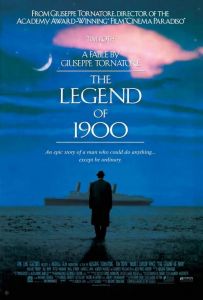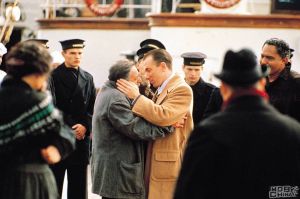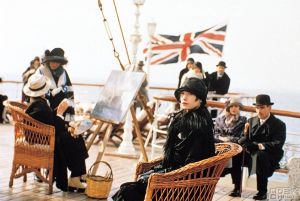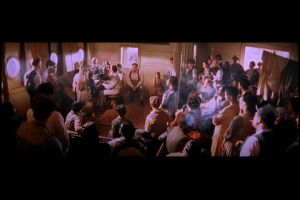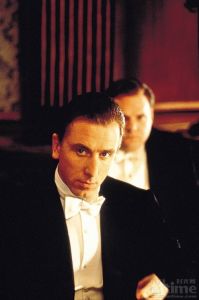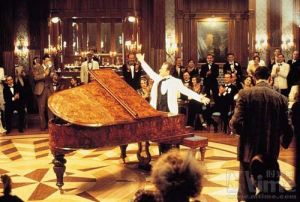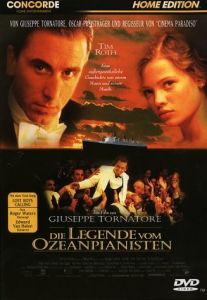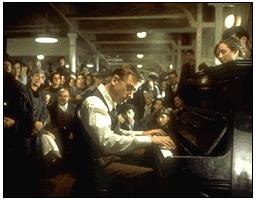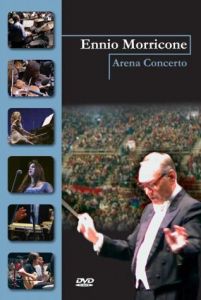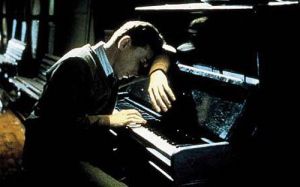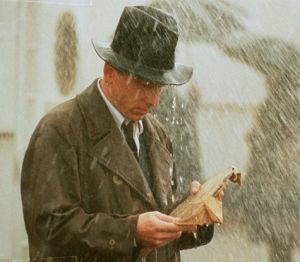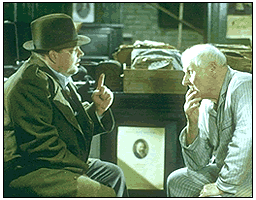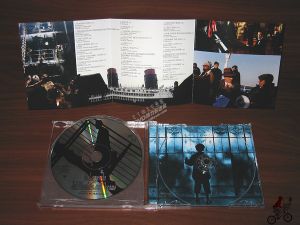The Legend of 1900
The Legend of 1900 (海上钢琴师) is a 1998 film directed by the Italian filmmaker Giuseppe Tornatore. This is Tornatore's first English-language film. The film is inspired by a theater monologue, Novecento. The film was nominated for a variety of awards worldwide, winning several for its soundtrack.
Directed by: Giuseppe Tornatore
Written by: Giuseppe Tornatore
Music by: Ennio Morricone
Cinematography: Lajos Koltai
Editing by: Massimo Quaglia
Distributed by:
Italy: Medusa Film
United States: Fine Line Features
Release dates:
October 28, 1998 (Italy)
October 29, 1999 (United States)
December 17, 1999 (United Kingdom)
Running time
Italy: 160 min.
United States: 120 min.
Country: Italy
Language: English
Genre: Drama Fantasy Music Romance
Tim Roth as 1900 (Danny Boodman T.D. Lemon 1900)
Pruitt Taylor Vince as Max Tooney
Mélanie Thierry as The Paduan Girl
Bill Nunn as Danny Boodman
Clarence Williams III as Jelly Roll Morton
Peter Vaughan as the Shopkeeper
Niall O'Brien as Harbor Master
Gabriele Lavia as Farmer
Cory Buck as 1900 (age 8)
Harry Ditson as Naval Captain
Heathcote Williams as Dr. Klauserman
The story is told in media res as a flashforward. Max Tooney, a musician, enters a secondhand music shop just as it's closing, broke and badly in need of money. He only has a trumpet, which he sells for less than he had hoped. Clearly torn at parting from his prized possession, he asks to play it one last time. The shopkeeper agrees, and as the musician plays, the shopkeeper immediately recognizes the song from a broken record master he found inside a recently acquired secondhand piano. He asks who the piece is by, and Max tells him the story of 1900.
1900 was found abandoned on the four stacker SS Virginian, a mere baby in a hand basket, and likely the son of poor immigrants from steerage. On the 1st of January in 1900, Danny Boodmann (Bill Nunn), the mechanic of the transatlantic liner Virginian bound for America, finds an abandoned baby on board and decides to keep him. He names the boy Danny Boodman T. D. Lemon 1900 and hides him from the ship's officers. During the early years of his life 1900 comes across an advertisement for an man with the initials of T.D, however Danny upon seeing the advertisement and possibly 1900's biological father decides not to tell 1900 the truth. Sadly, a few years later, Danny is killed in a workplace accident, and 1900 is forced to survive aboard the Virginian as an orphan. For many years, he travels back and forth across the Atlantic, keeping a low profile and apparently learning the languages spoken by the immigrants in Third Class.
The boy shows a particular gift for music, however, and eventually grows up and joins the ship's orchestra. He befriends Max in 1926, but never leaves the vessel, even when presented the opportunity to fashion a new life with a pretty immigrant girl. Apparently, the outside world is too big for his imagination at this point. But he stays current with outside musical trends as passengers explain to him a new music trend or style, and he immediately picks it up and starts playing it for them.
His reputation as a pianist is so renowned that Jelly Roll Morton, of New Orleans jazz fame, on hearing of 1900's skill comes aboard to challenge him to a piano duel. After hearing Jelly Roll Morton's first tune 1900 plays a piece so simple and Morton can't help but feel mocked. As Morton becomes more determined to display his talent, he plays an impressive improvised tune that brings tears to 1900's eyes. 1900 calmly sits down at the piano and plays the entire tune that Morton had just improvised, from memory. 1900's playing fails to impress the crowd until he plays an original piece of such virtuosity that the metal piano strings become hot enough to light a cigarette, which 1900 then hands to Morton, who has lost the duel.
A record producer, having heard of 1900's prowess, brings a primitive recording apparatus aboard and cuts a demo record of a 1900 original composition. But the pianist ends up smashing it, offended at the prospect of anyone hearing the music without his having performed it.
The story flashes back to the mid-1940s periodically, as we see Max trying to lure 1900 out of the now-deserted hulk of the ship. Having served as a hospital ship and transport in World War II, she is scheduled to be scuttled and sunk far offshore. Max manages to get aboard the ship with the recording 1900 made long ago and plays it, hoping to attract 1900's attention. When it does, Max attempts to convince 1900 to leave the ship. But he is simply too daunted by the size of the world. And feeling that his fate is tied to the ship, 1900 cannot bring himself to leave the only home he has known. In the end, the Virginian blows up and sinks, presumably with 1900 still aboard.
After two films about cinema, Giuseppe Tornatore comes up with the story of a highly imaginative artist who lives only for and through his art. Tornatore was inspired by a theatre monologue written in 1994 by Alessandro Baricco. The film was shot partly in Odessa, on a sixty-year-old Russian freighter, and partly in the Cinecitta studios in Rome. Tim Roth's performance as the talented but reserved Novocento is remarkable, and the music of Ennio Morricone plays a vital role in the film.
There was actually a registered ship named the SS Virginian which was built in 1904 and scrapped around 1954. The SS Virginian also had a vital part in the Titanic disaster in April 1912 as she was reported near the vicinity of the sinking and within radio contact. Exterior shots of the ship are the inspired blueprints of the SS Lusitania and her sister ship the SS Mauritania. The ballroom in which 1900 plays his piano in had a dome similar to the dome the SS Mauritania had in her ballroom during the transatlantic period.
"Lost Boys Calling"
Music by: Ennio Morricone
Lyrics by: Roger Waters
Produced by: Patrick Leonard
Performed by: Roger Waters
Guitar solos by: Edward Van Halen
Come hold me now
I am not gone
I would not leave you here alone
In this dead calm beneath the waves
I can still hear those lost boys calling You could not speak
You were afraid To take the risk of being left again
And so you tipped your hat and waved and then
You turned back up the gangway of that steel tomb again
And in Mott street in July
When I hear those seabirds cry
I hold the child
The child in the man
The clild that we leave behind
The spotlight fades
The boys disband
The final notes lie mute upon the sand
And in the silence of the grave
I can still hear those lost boys calling
We left them there
When they were young
The men were gone until the west was won
And now there's nothing left but time to kill
You never took us fishin’ dad and now you never will
And in Mott street in July
When I hear the seabirds cry
I hold the child
The child in the man
The child that we leave behind
La leggenda del pianista sull'oceano, which was retitled The Legend of 1900 for US distribution after forty-five minutes have been cut, was originally two hours and forty minutes when it was shown to great success in Italy in autumn of 1998. The US version had its world premiere at the 1999 Locarno International Film Festival.
1900: Take piano: keys begin, keys end. You know there are 88 of them. Nobody can tell you any different. They are not infinite. You're infinite... And on those keys, the music that you can make... is infinite. I like that. That I can live by...
1900: You rolled out in front of me a keyboard of millions of keys, millions and billions of keys that never end. And that's the truth Max, that they never end. That keyboard is infinite... and if that keyboard is infinite, then on that keyboard there is no music you can play. You're sitting on the wrong bench... That is God's piano.
1900: Christ, did you... did you see the streets, just the streets? There were thousands of them! Then how you do it down there, how do you choose just one... one woman, one house, one landscape to look at, one way to die...?
1900: Land? Land is a ship too big for me, it's a woman too beautiful, it's a voyage too long, perfume too strong...
The Legend of 1900 announces its intentions to play with the conventions of realistic storytelling from the start. Fine, but then give us a central character who's more than a cipher, a central conceit with more understandable motivation, and a man whose one moment of temptation is all too predictably offered by a young woman who's even more of a cipher than he is. Ravishing to look at and lovingly scored by Ennio Morricone, the film is really not hard to sit through, and you may find yourself wondering from time to time if the original cut, at 45 minutes longer, would actually make 1900 a more interesting person and dramatize his dilemma more persuasively.
—Author Tom Wiener
It is at a time like this I wish I could expand my vocabulary to better articulate the virtues and qualities of such a fine film. I also find I'm bursting to talk about this film that I regrettably saw alone. I don't want to spoil it for anyone, but desperately want to share it with everyone.
The story, music, cinematography, direction and, I hazard to say, a near perfect performance by Tim Roth combine to make for a compelling film. The story is told with a poetic lyricism that is immediately captivating and that is more than enhanced by Lajos Koltai's well stated cinematography. Clarance Williams III's controlled overstatement as an unexpectedly nasty Jelly Roll Morton is the perfect contrast to Roth's underplayed and unworldly 1900.
—Filmgoers
Camerimage (The International Film Festival of the Art of Cinematography)
Best Cinematography, Lajos Koltai
Best Film
Best Screenplay
Satellite Awards
Best Art Direction, Production Design, Francesco Frigeri and Bruno Cesari
Best Original Score, Ennio Morricone
Camerimage (The International Film Festival of the Art of Cinematography)
Best Cinematography, Lajos Koltai
Best Costume Design, Maurizio Millenotti
Best Director, Giuseppe Tornatore
Best Music, Ennio Morricone
Best Production Design, Francesco Frigeri
European Film Awards
Best Cinematographer, Lajos Koltai
Golden Globes
Best Original Score - Motion Picture, Ennio Morricone
Guild of German Art House Cinemas
Foreign Film, Giuseppe Tornatore
Italian National Syndicate of Film Journalists
Best Costume Design, Maurizio Millenotti
Best Director, Giuseppe Tornatore
Best Production Design, Francesco Frigeri
Best Screenplay, Giuseppe Tornatore
The musical research for composing the movie's original score, Ennio Morricone
http://user.qzone.qq.com/839308761/infocenter?ptlang=2052
附件列表
词条内容仅供参考,如果您需要解决具体问题
(尤其在法律、医学等领域),建议您咨询相关领域专业人士。

